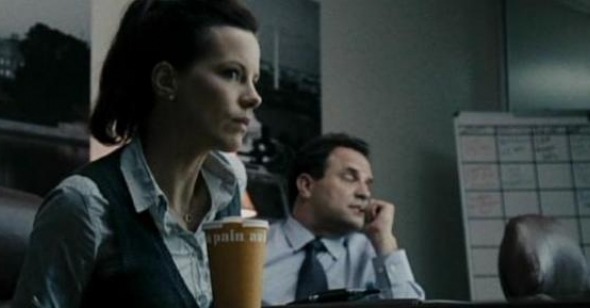So Help Me God
by Jeff Reichert
Nothing but the Truth
Dir. Rod Lurie, U.S., Yari Film Group
Over the past eight years we’ve witnessed all too often the efficacy with which artfully packaged media confections can erode master narratives and refigure commonly held notions of “true” via selective elisions. I don’t know writer-director Rod Lurie’s politics, and his agenda with his latest ripped-from-some-headline political thriller, Nothing but the Truth, may, in actuality, be nothing more than spinning a ripping yarn, but it’s hard to shake the feeling that, for some reason, Lurie’s taken it upon himself to recast the Judith Miller/Valerie Plame scandal as some kind of heroic battle of principles. Yes, the first thing we see on screen is a title card informing us of the fictional nature of the proceedings to follow, but isn’t this sort of attention diversion the necessary first step toward any realignment of the cultural unconscious?
Maybe I’m misremembering, but wasn’t Judith Miller the ossified D.C. cocktail-party circuit shill who lapped greedily from the hands of power and led the cheering squad for the Iraq War? You’d never know it from Lurie’s “fictional” take. Miller’s reconstituted here as Rachel Armstrong, a clean-browed soccer mom journalist with a conscience, played with misdirected energy by everyone’s favorite almost-there, Kate Beckinsale. After a horribly awkward opening sequence in which an attempt is made on the president’s life, Nothing but the Truth kicks into gear on the eve of the publication of a story by Rachel so huge, so earth-shattering, that it will literally “bring the White House down.”
Instead, after she’s outed Plame stand-in Erica Van Doren (Vera Farmiga, unconvincingly selling a Bourne-ish bravado), whose research trip to Venezuela (!) exonerates the country for the assassination attempt, Rachel finds herself unceremoniously tossed in the clink by zealous special prosecutor Patton Dubois (Matt Dillon, in a performance as silly as his character’s moniker), where she sits, staunch in her refusal to divulge her source, even as her family begins to disintegrate after months of separation. The amalgamation of key qualities of husband-wife duo Valerie Plame (undercover CIA Agent) and former Ambassador Joe Wilson (involved in a fact-finding mission with embarrassing political implications) into the figure of Erica allows Rachel to maintain the righteousness the film needs to press forward—her revelation of the Venezuela scandal, is, of course, the stuff Woodwards and Bernsteins are made of. But this isn’t exactly how things happened in real life.
It’s easy to forget that Miller never wrote about Plame at all; credit for the actual identity exposure goes to Robert Novak. Judy merely held onto her sources for principle and personal gain—trading 85 days behind bars for a recently inked Fox News contract probably wasn’t too bitter a pill. As with the real Plame controversy, Lurie deflects the main questions that situations like these should raise around the First Amendment in favor of facile grandstanding. And he’s made it easier to do so by fully coding Rachel’s actions as falling in line with a nebulous greater good. Instead of the tired national security vs. freedom of speech debate, it’d be great to have a dialogue about the implied contractual nature of the Bill of Rights, about how our Founding Fathers likely expected some reasonably responsible behavior on the part of its citizenry in return for these rights carved out from the government. This kind of complexity doesn’t make for easy or exciting cinema, and ignoring a real, hard civics lesson is an obvious choice for a political thriller. This is Lurie’s right. But that doesn’t mean we need to like the results.
We can all agree that democracy’s messy any way you cut it, and Lurie’s filmmaking certainly follows suit; on a very concrete level, there’s just more movie here than the director seems up to juggling. Like Clint Eastwood’s recent Changeling, Nothing but the Truth is crammed with enough material to form the basis of three different genre films—a courtroom drama, a high-stakes political thriller, and a sweaty tangled-hair women-in-prison flick. This kind of casserole goes down easy when the preparer is aware of the implications of the mix-and-match (see Arnaud Desplechin’s splendid A Christmas Tale), but not when it’s taken for granted that making unholy genre stew requires a deft hand with the ingredients. It’d almost be possible to give Nothing but the Truth a soft pass for providing the requisite Washington-insider drama of the season if the Coen brothers hadn’t already ruthlessly dissected the town in their underrated Burn After Reading.
What to take from Nothing but the Truth, then? How about this choice bit (sadly representative of the film’s dramatic strategies): opposing lawyers and Rachel assemble in the judge’s quarters to go over the newly produced waivers signed by all senior White House staff that release the imprisoned journalist from maintaining confidentiality. Rachel briefly scans the papers, but replaces them on the judge’s desk—she’s determined the documents to be the results of coercion and refuses the bait. Throughout, the sound of a tea kettle coming to boil. Just as tension in the room reaches its highest point, the kettle starts whistling. The judge gets up. “Would anyone like tea?” he asks. “It’s Greek.”
